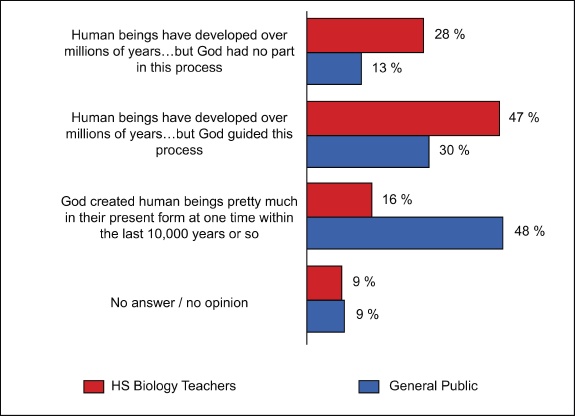Co-authors Randy Moore and Sehoya Cotner, professors in the College of Biological Sciences, surveyed 1,000 students taking introductory biology classes at the University of Minnesota to learn how biology majors view evolution compared to non-majors. Results showed that the two groups' views were similar and revealed that high school biology teachers influence whether majors and non-majors college students accept evolution or question it based on creationism.
About two thirds of students from both groups said their high school biology class included evolution and not creationism. Only 1 to 2 percent of classes covered creationism and not evolution. And 6 to 13 percent of classes did not cover either evolution or creationism. But 29 percent of majors and 21 percent of non-majors said their high school biology class covered both evolution and creationism.
So the good news is that even in classes that covered both creationism and science, students still accepted science enough to major. Teachers may be forced to cover creationism in some school districts but that doesn't mean they necessarily want to do it. However, it still remains overall that only 28-37% of high school biology teachers keep a strict science basis for human evolution, which means either they are wise enough to stay out of the culture wars or trust the intelligence of their students to learn the scientific method .

Figure 2 from Berkman, Pacheco, and Plutzer, PLoS Biol 6(5): e124
Students whose high school biology class included creationism (with or without evolution) were more likely to accept creationist views as entering college students. Similarly, students exposed to evolutionism but not creationism were more likely to accept evolution in college. For example, 72 to 78 percent of students exposed to evolution only agreed that it is scientifically valid while 57 to 59 percent of students who were exposed to creationism agreed that it can be validated.
"I've long known that many biology teachers teach creationism, but was surprised to learn they have such a strong impact," said Randy Moore, professor of biology and lead author. "It's unfortunate that so many teachers think their religious beliefs are science. Teachers who don't teach evolution deny students the understanding of one of the greatest principles in history."
"I was shocked that there weren't bigger differences between majors and non-majors," said Sehoya Cotner, associate professor of biology. "Evolution is the foundation of the entire discipline. It leads me to believe that these students are probably interested in biology for reasons besides gaining a full understanding and appreciation of the science."
The article included a review of previous studies that explain why so many high school biology teachers endorse creationism. The studies say that more than 25 percent of biology teachers do not know it is unconstitutional to teach creationism. One third didn't major in biology in college and never studied evolution. One fourth believe that creationism can be proven scientifically. Administrators, parents or colleagues may pressure them. There are usually no consequences for teachers who do not cover evolution or who teach creationism.
The authors are interested in working with high school biology teachers -- and particularly with college students who plan to teach biology -- to improve their understanding of evolution and develop best practices for covering sensitive topics such as human evolution and life's origins.




Comments